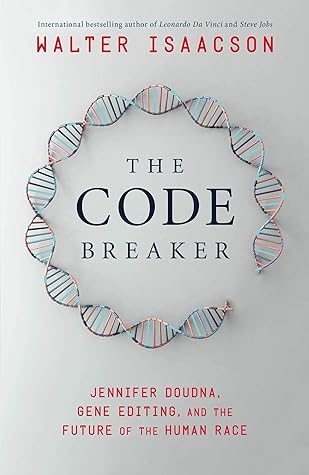More on this book
Community
Kindle Notes & Highlights
Franklin was a focused scientist, sensibly dressed. As a result she ran afoul of English academia’s fondness for eccentrics and its tendency to look at women through a sexual lens, attitudes apparent in Watson’s descriptions of her. “Though her features were strong, she was not unattractive and might have been quite stunning had she taken even a mild interest in clothes,” he wrote. “This she did not. There was never lipstick to contrast with her straight black hair, while at the age of thirty-one her dresses showed all the imagination of English bluestocking adolescents.” Franklin
Sexism in science - all that mattered was whether she was attractive, wore makeup and nice clothes!!
In the weirdness engendered by red-baiting and McCarthyism, Pauling was stopped at the airport in New York and had his passport confiscated because he had been spouting enough pacifist opinions that the FBI thought he might be a threat to the country if allowed to travel. So he never got the chance to discuss the crystallography work done in England, thus helping the U.S. lose the race to figure out DNA.
Watson’s science had intersected with real life. The massive international project to map the human genome would no longer be for him an abstract, academic pursuit. It was personal, and it would ingrain in him a belief, bordering on obsession, in the power of genetics to explain human life. Nature, not nurture, made Rufus the way he was, and it also made different groups of people the way they were.
“Today we are learning the language in which God created life,” President Clinton proclaimed at the White House ceremony
Szostak had a guiding principle: Never do something that a thousand other people are doing. That appealed to Doudna. “It was like when I was on the soccer field and wanted to play a position that the other kids didn’t,” she says. “I learned from Jack that there was more of a risk but also more of a reward if you ventured into a new area.”
Their choice of Berkeley is a testament to America’s investment in public higher education. Its roots stretch back to when Abraham Lincoln, in the middle of the Civil War, thought public education was important enough that he pushed through the Morrill Land-Grant Act of 1862, which used funds from federal land sales to establish new agriculture and mechanical colleges.
When new viruses came along, the bacteria that survived were able to incorporate some of that virus’s DNA and thus create, in its progeny, an acquired immunity to that new virus. Mojica recalls being so overcome by emotion at this realization that he got tears in his eyes.8 The beauty of nature can sometimes do that to you.
From this misstep, she became more aware of her passions and skills—and also her weaknesses. She liked being a research scientist in a lab. She was good at brainstorming with people she trusted. She was not good at navigating a corporate environment where the competition was for power and promotions rather than discoveries. “I didn’t have the right skill set or passions
This transition from player to coach happens in many fields. Writers become editors, engineers become managers. When bench scientists become lab heads their new managerial duties include hiring the right young researchers, mentoring them, going over their results, suggesting new experiments, and offering up the insights that come from having been there.
Women in science tend to be shy about promoting themselves, and that has serious costs. A study in 2019 of more than six million articles with women as the principal author showed that they are less likely to use self-promotional terms, such as “novel” and “unique” and “unprecedented,” to describe their findings.
They paused for a moment and looked at each other, then Doudna said, “Wow.” As she recalls, “It was one of those moments in science that just comes to you. I had this chill and these little hairs on my neck standing up. In that moment, the two of us realized that this curiosity-driven, fun project had this powerful implication that could change the direction of the project profoundly.”
afternoon sun setting over San Francisco Bay, Doudna spoke of how pleasant it had been collaborating with her. “It was a glorious moment when we finally got to share in person the joy of discovery and also some personal confidences,” Doudna recalled. “We got to take a breath and talk about how hard we’d worked together across thousands of miles.”


